We use cookies to ensure that we give you the best experience on our website. If you continue to use this site we will assume that you are happy with it
Can You Pass a Background Check With a Warrant? Only If Police Did This
 Written by Background Check Repair
Written by Background Check Repair
Background Checks | May 14, 2024
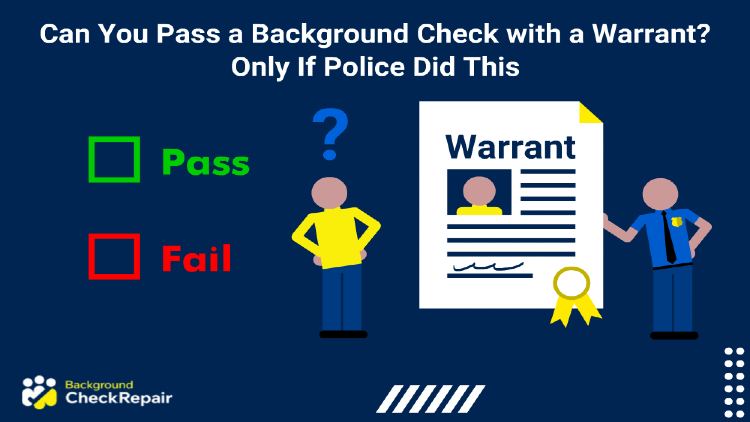
Table of Contents
Can you pass a background check with a warrant? What if my record has a pending warrant on it right now?
These are questions many people have if they’re concerned about multiple parking tickets, speeding tickets, driving under the influence (DUI), or many other incidents that may cause a warrant for your arrest.
But, if you’re wondering if you can pass a background check with a warrant, the answer is only if police have actually executed the warrant, it’s a search warrant, and the proper paperwork has been filed. In other words, a warrant will not show up until law enforcement officials actually execute it.
Simply put, an outstanding warrant will likely only show up once it has actually been transformed into an arrest, but there are times when they can.
But what about actually passing the background check? That requires a slightly longer explanation, found below.
Employment Background Checks: Can I Pass?
Understanding employment background checks and what background checks show is important, because a “criminal” background check is often synonymous with a “regular” background check. It reveals information that can prohibit someone not just from obtaining employment, but also from renting, adopting, getting a bank loan, and impacts many other big life events.
Warrants often appear on what is known as a comprehensive records check that explores local jurisdictions and police databases. Fortunately, there are ways to find out if a warrant is in your criminal history. Depending on how the search is performed and what county the warrant has been served in, this may only apply to a level 1 check.
This is because warrants will appear on your criminal background check if it is a search warrant submitted by a police officer to the court or a bench warrant issued by a judge.
A criminal background check reveals convictions, arrests, and even pending proceedings, but familiarity with the rules in your state is important, as every municipality and state has its own set of rules. This includes how warrants are treated by those running your criminal inquiry, as well as ways to remove or expunge warrants.
However, be warned that even if nothing shows up on a local check, a warrant could be visible at the federal level. This is why the very first step you should take is completing a check for federal warrants. This will show active warrants for every county in the country.
Unfortunately, the criminal justice system is often very confusing, so you’ll need to know if the police actually filed the paperwork for your warrant. In most cases, this will happen when an actual arrest, with or without conviction, is made.
Background Check: What Type of Warrants Won’t Show Up?
Can you pass a background check with a warrant? Whether a warrant appears on a background investigation depends on what type of warrant there is on someone’s record.
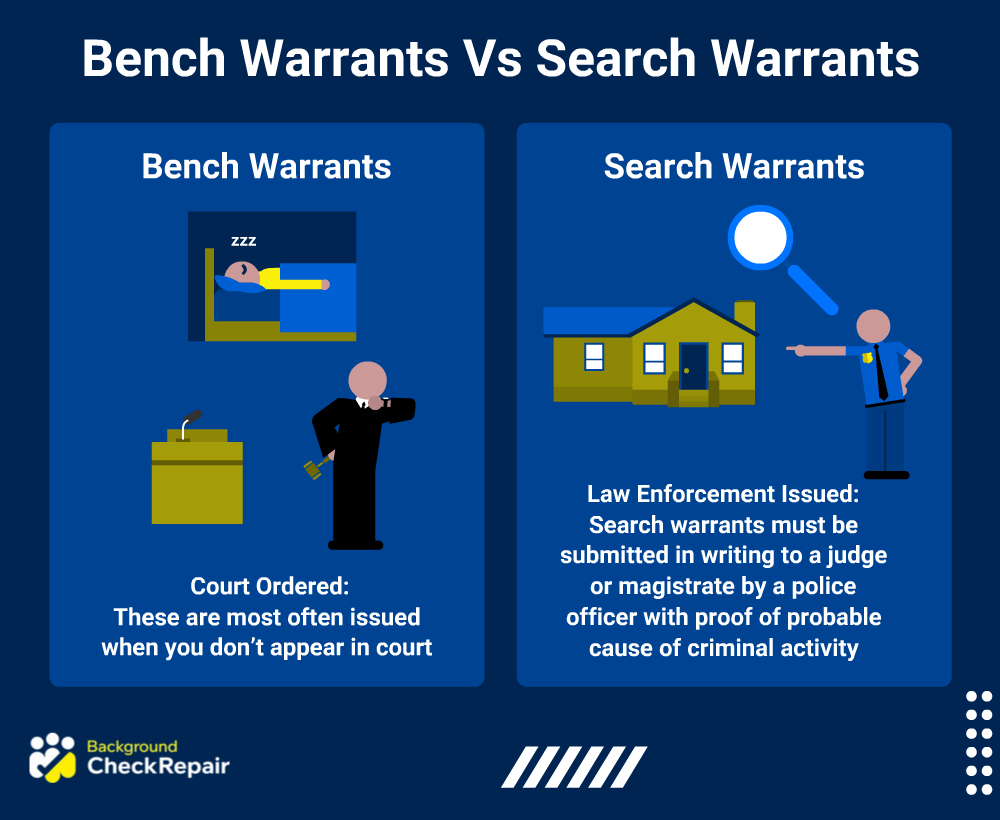
That’s because background checks tell a potential employer, landlord, or bank, comprehensive information about criminal activity (or lack thereof). The verification process explained below is the best way to see if a warrant has been created in someone’s name.
However, the process for updating the databases that are searched for background checks takes time. In other words, the database may not be fully updated yet with your warrant. Furthermore, depending on what type of warrant was issued, it may or may not show up.
Regardless, you should check the databases below as soon as possible.
Bench Warrant: Court Ordered
This type of warrant, a bench warrant (not a beach warrant) is created by a seated judge. These are most often issued when you don’t appear in court due to proceedings for a DUI, domestic violence crimes, drug crimes, a traffic ticket, or even a felony case. If you were ordered to present yourself, but didn’t, the judge can issue a warrant.
When you don’t appear, a bench warrant will be issued. You may not be a criminal at all and just didn’t get the notification that your speeding ticket was being adjudicated in a local court because you got it while traveling many cities away from your home address. If a driver’s license address isn’t up to date, this is very common. Unless you’re able to prove that there is a very good reason you didn’t show up, you’ll still have a warrant on your record.
Once a bench warrant is created, it goes into a court clerk database in that jurisdiction which means if stopped by a police officer or for any other occasion, perhaps in a common traffic violation, authorities have a right to arrest the individual and take them into custody.
You don’t want to allow someone to run an inquiry on you with a bench warrant pending though. So it’s important to find out if any warrants exist by contacting the local courts in your area and within your state. Simply search the court clerk’s office resources for active warrants to see if any bench warrants have been issued.
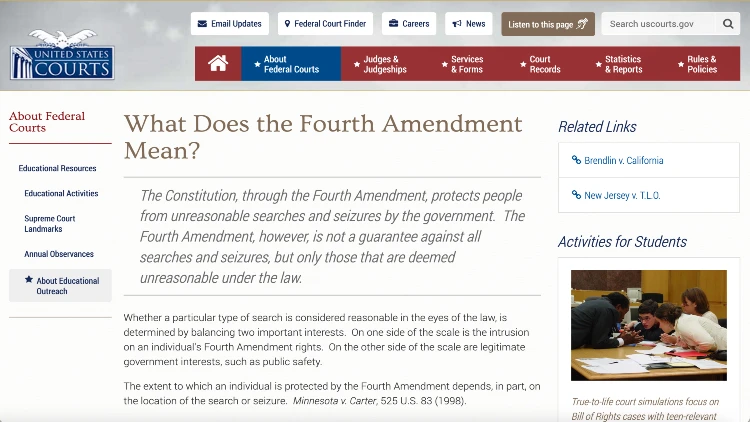
(Image: U.S. Courts3)
The Fourth Amendment protects you from having warrants out for your arrest without offering you due process of law.1
Search Warrant: Law Enforcement Issued
Warrants given by police officers are called search warrants and are very specific. Search warrants must be submitted in writing to a judge or magistrate by a police officer with proof of probable cause. It must detail what criminal activity was committed and outline what might be found if the person, their home, or belongings were searched, in order to uncover more details about the criminal activity that’s suspected of being done. Any police warrant must contain these facts.
However, modifications to search and bench warrant laws vary by state. For example, recent ‘red flag’ laws do provide law enforcement and the judicial branch with greater ease is issuing and serving search warrants.
How Do I Know If I Have a Record of Warrant?
Suspect you may have a record including a warrant, or maybe you’re wondering if a criminal case has been brought against you. This can take a little extra effort since people are not often notified if a criminal charge is brought against them by a court. This is so that defendants don’t flee when they find out there is a possible pending arrest.
Someone’s warrant may have been created for any of three varieties of criminal activity:
- An infraction: The most minor type of criminal charge that usually requires you to pay a fine or be on probation. A common type of infraction is a speeding ticket or failure to stop at a red light. You likely won’t be arrested or go to jail for this type of activity. These offenses are considered minor, but they show up on background checks. Warrants are instigated if you fail to appear in court to take care of an infraction. If someone contacts the court after missing a court date, this will often prevent the warrant from being issued, either because they prove they weren’t given proper notice, or they have a very good excuse for not being there (such as military service or a family emergency), because they schedule a future court date, or attend a driver’s education course, for example. Once they communicate with the court or submit their driver’s education certificate, the infraction and warrant are removed from their history. Every state, such as Texas, New York, or Florida, has its own description of infractions and how they are handled by courts.2
- A misdemeanor: Warrants for misdemeanor crimes are less serious than felony crimes, but more serious than infractions. There are also classes of misdemeanors. If someone is accused of committing a misdemeanor, it isn’t a bad idea to get a lawyer to not only prevent arrest but also to possibly have the crime expunged from their criminal background check now and in the future.
Consult legal help since some misdemeanors are difficult to remove from criminal records. Others, such as Class C criminal charges, are easier to remove because they’re less severe. - A felony criminal charge: Criminal records that show up on background checks with a felony charge are a lot more difficult to deal with. A felony charge usually results in arrest and prison time. Your state may have guidance disallowing employers or landlords from bypassing you for a job or apartment due to a felony charge called “ban the box” laws through The Second Chance Alliance and Congress, but not all states protect those with a criminal record in their background check.
Your legal team needs to work closely with the courts and applicable law to prevent this from staying on your record if possible, especially in the case of a minor. For adult felony charges, these usually stay on your background check records for at least seven years, and sometimes longer.
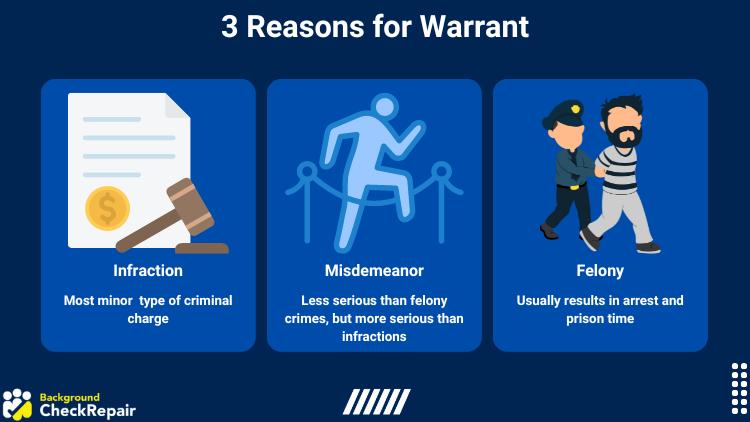
Can you pass a background check with a warrant…You’ll need to find out what type of warrant you have, and exactly what type of criminal activity as described above is on your records.
Does someone contact local law enforcement agencies or use checking sites that are publicly available to search for your record? In that case, the answer is perhaps.
The only problem with these two methods of contacting a database admin or the authorities of law is that free background checks may not reveal all the warrants for someone’s arrest and a law enforcement professional may not reveal that a person has a warrant until pending charges are acted upon. This is because if charges are disclosed, they do have to arrest someone on the spot.
Background Checking Sites
Criminal inquiries at background checking sites will provide some information including warrants, but the law in multiple states and the reporting methods of criminal activity make it difficult to get all the information that would likely show up on someone’s background check.
Background checks include warrants if someone searches state or local municipality court documents, but if they don’t do a national search, there will likely be missing information. They are able to do a national database search but there are varying types to become familiar with, and they’ll need to know which one to use. What background checks include always changes depending on the source tapped.
The good news is using a background check site or online provider can let you know if you passed your background check regardless of the warrants issued. While the information may be slightly outdated, it is a good place to start and you can do so easily online in a few minutes.
Is a Fingerprint Background Check and FBI Background Check the Same?
Criminal background checks do include many different pieces of information, depending on what level is requested. The extent of a level 2 background investigation and what information it includes compared to level 1 background checks depends on what job or loan someone is applying for. Individuals can expect to see the following information in both level 1 and level 2 background checks:
- Misdemeanor Criminal Conviction Information
- Felony Criminal Conviction Information
- Criminal Activity within the Last 7 Years (Depending on the State)
- Pending Criminal Charges (Depending on the State)
Background checks will reveal any and all of this information.
A fingerprint check can include information in a number of databases, using your fingerprints to search through criminal records, firearm applications, and national criminal history databases.
These background checks are most often used for government and law enforcement positions, or high-paying C-suite jobs that handle lots of transactions or proprietary information within a company. A candidate will be asked to give their fingerprints to a searching agent so that court documents and national databases can be scoured.
Others will have someone physically go to a licensed location, and they will take your prints for you. What’s the duration of a fingerprint-based records check? Most warrants and criminal activity results come back within 2 to 6 weeks depending on laws in a state and processing times that vary at agencies or background check companies.
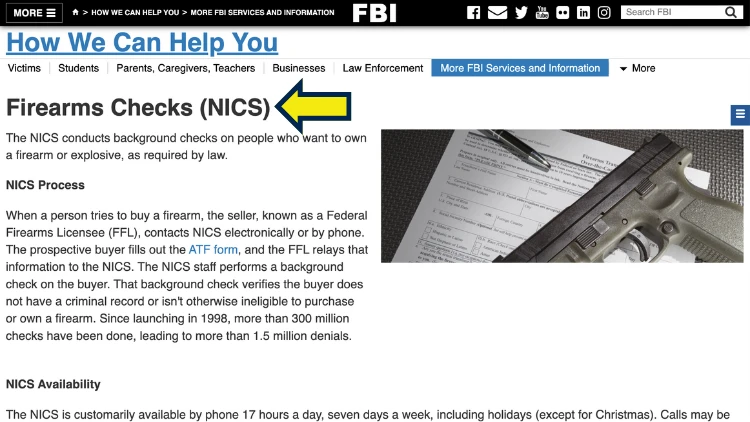
(Image: FBI4)
FBI background checks do use the National Instant Criminal Background Check System (NICS). The FBI also taps into all public databases to determine if there are misdemeanor or felony criminal convictions.
FBI checks take between 30 days and a few months. There are things you can do to expedite it, though, including using a channeler (literally someone who works with multiple agencies to get all your information) and making sure you don’t make a single mistake on the form you are required to fill out, as this can cause your records to be delayed.
Can you pass a background check with a warrant from an FBI inquiry? Do you wait and try to contact the courts or hire someone? You can contact a criminal lawyer to be certain.
Do I Need a Criminal Defense Lawyer for My Warrants?
Criminal records can sometimes be expunged or deleted from your records if you use the services of a defense lawyer.
Even if you don’t have an actual arrest on your records, warrants can cause you to be turned down for employment, credit, or a home purchase or lease. The Fair Credit Reporting Act (FCRA) protects you to some degree if your records contain criminal activity, but legal help may be needed if your criminal records contain more serious crimes.
Can you pass a background check with a warrant…yes, but it depends on the information detailed above. Furthermore, if police have served the warrant successfully and the paperwork has been filed, it will likely show up on certain criminal history checks.
References
1Chambers Law Firm. Dec. 7, 2021. Different Types of Warrants. (n.d.). YouTube. <https://www.youtube.com/watch?v=EwmEdIsoiqc>
2Texas Courts.gov. Dec. 7, 2021. Explanation of Case Categories. nd. Web. <https://www.txcourts.gov/media/1436691/1-municipal-court-case-types.pdf>
3United States Courts. (2024). What Does the Fourth Amendment Mean? United States Courts. Retrieved May 14, 2024, from <https://www.uscourts.gov/about-federal-courts/educational-resources/about-educational-outreach/activity-resources/what-does-0>
4FBI. (n.d.). Firearms Checks (NICS). Federal Bureau of Investigation. Retrieved May 14, 2024, from <https://www.fbi.gov/how-we-can-help-you/more-fbi-services-and-information/nics>
